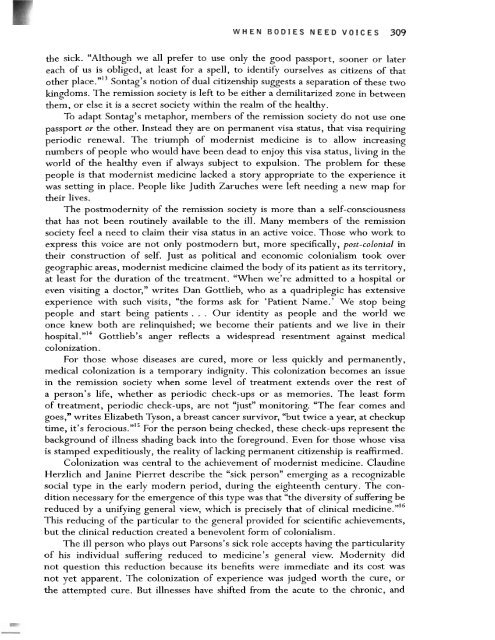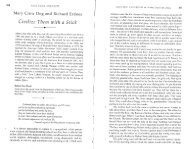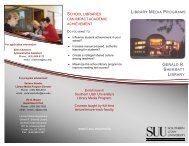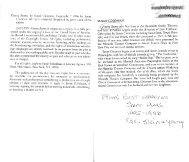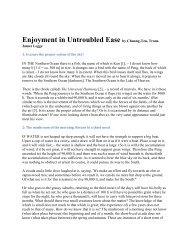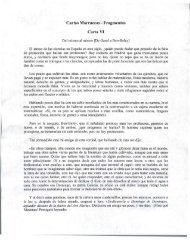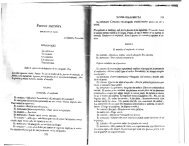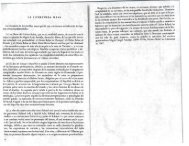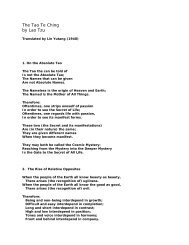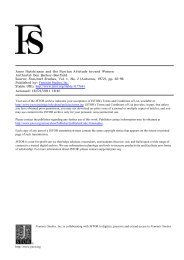Arthur Frank
Arthur Frank
Arthur Frank
Create successful ePaper yourself
Turn your PDF publications into a flip-book with our unique Google optimized e-Paper software.
WHEN BODIES NEED VOICES 309<br />
the sick. "Although we all prefer to use only the good passport, sooner or later<br />
each of us is obliged, at least for a spell, to identify ourselves as citizens of that<br />
other place."13 Sontag's notion of dual citizenship suggests a separation of these two<br />
kingdoms. The remission society is left to be either a demilitarized zone in between<br />
them, or else it is a secret society within the realm of the healthy.<br />
To adapt Sontag's metaphor, members of the remission society do not use one<br />
passport or the other. Instead they are on permanent visa status, that visa requiring<br />
periodic renewal. The triumph of modernist medicine is to allow increasing<br />
numbers of people who would have been dead to enjoy this visa status, living in the<br />
world of the healthy even if always subject to expulsion. The problem for these<br />
people is that modernist medicine lacked a story appropriate to the experience it<br />
was setting in place. People like Judith Zaruches were left needing a new map for<br />
their lives.<br />
The postmodernity of the remission society is more than a self-consciousness<br />
that has not been routinely available to the ill. Many members of the remission<br />
society feel a need to claim their visa status in an active voice. Those who work to<br />
express this voice are not only postmodern but, more specifically, post-colonial in<br />
their construction of self. Just as political and economic colonialism took over<br />
geographic areas, modernist medicine claimed the body of its patient as its territory,<br />
at least for the duration of the treatment. "When we're admitted to a hospital or<br />
even visiting a doctor," writes Dan Gottlieb, who as a quadriplegic has extensive<br />
experience with such visits, "the forms ask for 'Patient Name.' We stop being<br />
people and start being patients . . . Our identity as people and the world we<br />
once knew both are relinquished; we become their patients and we live in their<br />
hospital."'4 Gottlieb's anger reflects a widespread resentment against medical<br />
colonization.<br />
For those whose diseases are cured, more or less quickly and permanently,<br />
medical colonization is a temporary indignity. This colonization becomes an issue<br />
in the remission society when some level of treatment extends over the rest of<br />
a person's life, whether as periodic check-ups or as memories. The least form<br />
of treatment, periodic check-ups, are not "just" monitoring. "The fear comes and<br />
,,<br />
goes, writes Elizabeth Tyson, a breast cancer survivor, "but twice a year, at checkup<br />
time, it's ferocio~s."'~ For the person being checked, these check-ups represent the<br />
background of illness shading back into the foreground. Even for those whose visa<br />
is stamped expeditiously, the reality of laclung permanent citizenshp is reaffirmed.<br />
Colonization was central to the achievement of modernist medicine. Claudine<br />
Herzlich and Janine Pierret describe the "sick person" emerging as a recognizable<br />
social type in the early modern period, during the eighteenth century. The condition<br />
necessary for the emergence of this type was that "the diversity of suffering be<br />
reduced by a unifying general view, which is precisely that of clinical medicine."I6<br />
This reducing of the particular to the general provided for scientific achievements,<br />
but the clinical reduction created a benevolent form of colonialism.<br />
The ill person who plays out Parsons's sick role accepts having the particularity<br />
of his individual suffering reduced to medicine's general view. Modernity did<br />
not question this reduction because its benefits were immediate and its cost was<br />
not yet apparent. The colonization of experience was judged worth the cure, or<br />
the attempted cure. But illnesses have shifted from the acute to the chronic, and


